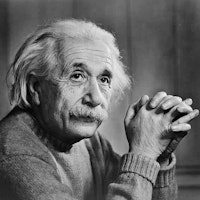Our task must be to free ourselves… by widening our circle of compassion to embrace all living creatures and the whole of nature in its beauty.
Albert Einstein

Widening Our Circle of Compassion
Topic: Love, Compassion, & Kindness
A human being is part of the whole, called by us ‘universe,’ a part limited in time and space. He experiences himself, his thoughts and feelings, as something separate from the rest—a kind of optical delusion of consciousness. This delusion is a kind of prison for us, restricting us to our personal desires and to affection for a few persons nearest to us. Our task must be to free ourselves from this prison by widening our circle of compassion to embrace all living creatures and the whole of nature in its beauty.
Albert Einstein, born on 14 March 1879 and passing away on 18 April 1955, stands as one of the most renowned theoretical physicists in history. Best known for his groundbreaking special and general theories of relativity, his scientific endeavors spanned a multitude of areas within the field of physics. Amongst his numerous accolades, he was awarded the Nobel Prize in physics for his elucidation of the photoelectric effect—a phenomenon that expanded the horizons of quantum theory.
Einstein's journey, however, wasn't merely defined by scientific discoveries, but by the myriad challenges he overcame across various dimensions of his life. In his spiritual journey, he grappled with the concepts of God and universe. Socially, he navigated the complexities of his time—facing the rise of anti-Semitism, experiencing exile from his homeland due to Nazi oppression, and advocating for civil rights, disarmament, and global peace. These adversities only strengthened his resolve and underscored his resilience.
Beyond his professional accomplishments, Einstein's life was enriched by a tapestry of relationships and dialogues with luminaries from diverse fields. He engaged in profound conversations on the nature of reality with the likes of the Indian poet Rabindranath Tagore, discussed the principles of non-violence with Mohandas Gandhi, and deliberated on humanitarian issues with Albert Schweitzer. Furthermore, his camaraderie with fellow scientists and physicists provided a fertile ground for intellectual exchanges, fostering an environment of collaboration and innovation during one of the most exciting epochs in scientific history.
Levy, Naomi. Einstein and the Rabbi: Searching for the Soul. Flatiron Books, Macmillan, 2018 [Naomi Levy, Einstein and the Rabbi: Searching for the Soul] pp. 22-23.

Albert Einstein
Theme: Compassion

About This Albert Einstein Quotation [Commentary]
Albert Einstein begins with a plain fact: “A human being is part of the whole, called by us ‘universe,’ a part limited in time and space.” Yet we “experience” ourselves—“thoughts and feelings”—as “something separate from the rest,” an “optical delusion of consciousness.” Einstein names what this delusion does to us: it becomes “a kind of prison,” narrowing our life to “our personal desires” and to “affection for a few persons nearest to us.”
From there, Albert Einstein gives a clear direction: “Our task must be to free ourselves from this prison.” The way out is not escape from the world, but a change in how we live inside it—“by widening our circle of compassion.” This widening follows his sequence of ideas: when the “delusion” loosens, the circle widens; when the circle widens, we are no longer confined to what is nearest and most familiar.
Einstein’s sentence ends where practice begins: “to embrace all living creatures and the whole of nature in its beauty.” He sets the scale of our care—“all living creatures”—and the setting of our belonging—“the whole… ‘universe.’” In that light, compassion is not a private feeling reserved for a few; it is the work of freeing ourselves, day by day, from the “optical delusion” that we are separate.
Rabbi Naomi Levy’s Commentary
Rabbi Naomi Levy frames “the mission of Einstein’s true religion” as a practice that “strive[s] to free us from the optical delusion of our consciousness that we are separate, when in truth we are one,” adding, “never before in human history do we need this message more.” She immediately turns that truth into a way of living: “To believe it, to know that we belong to each other,” because “we’re all part of a great wholeness, all things, the living and yes, even the dead,” and “it’s our delusion of separateness that causes us so much pain when in reality all is connected and intertwined.” To take it “a tiny bit deeper,” she cites Albert Einstein’s condolence note after Michele Besso died: “the distinction between past, present, and future is only a stubbornly persistent illusion,” and then lets her closing line carry the whole point with a steady warmth: “If that’s the mission of true religion I would love to be a rabbi in that religion.”
Resources
Related Quotes
Copyright © 2017 – 2026 LuminaryQuotes.com About Us